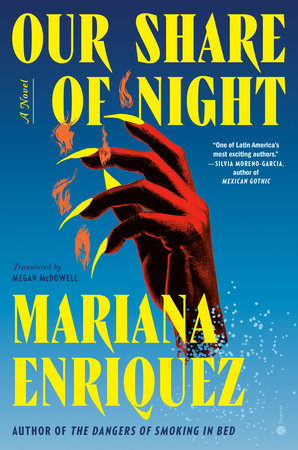Juan is determined to protect his son. A powerful medium, Juan has been exploited and abused by the Order for years, beginning in his childhood, and after marrying and having a child with Rosario -- the daughter of the most powerful family of the Order -- he knows that they will do anything to get their hands on Gaspar, who they plan on using for their own ends. Fleeing across the country after Rosario's untimely death, father and son encounter obstacle after obstacle, from the brutal tactics of Argentina's military dictatorship to Juan's own dark side, a side that often comes out when he is around Gaspar. As Gaspar grows older, it becomes clear that his inheritance is inextricably tied to cruelty, magic, and ultimately, death.
Following many characters and a jumping timeline, Our Share of Night is an epic that does its best to break every storytelling convention you can think of. Written by Mariana Enriquez, an Argentine journalist and author who made it onto the shortlist for the International Booker Prize, this novel is, at its heart, an occult version of the bildungsroman. What I noticed first upon picking this up was her immense ability in creating something that sinks its claws into you. From the very first page, there's intrigue, and also a sense of impending doom, an element that pervades the story from start to finish. We begin in the head of Juan Peterson, a father who is prepared to do anything to save his son from the selfsame cult that has ruined his life. He's mourning the death of his wife, Rosario, the daughter of the wealthy Reyes Bradford family, who also happen to be the foremost leaders of the cult he's so determined to escape. His son, Gaspar, is perhaps a touch too clever for such a young child, mirroring both his rebellious father and mother in many ways.
When Juan and Gaspar are making their way across the country, the military dictatorship -- coming to power during the infamous coup where Isabel Perón was overthrown -- is in full swing. Much of this book is political, and Enriquez deals with those issues both in the form of veiled allegories and in upfront, direct lines that speak of the forced disappearances taking place, of the torture, and the so-called Dirty War tearing the country apart. Enriquez's style of speech and writing is frank, but with characteristic flair and beauty; she never shies away from the ugly, and it makes her stories that much more compelling. Her characters, too, are just as gripping, although I found Gaspar to be strangely shallow in comparison to Juan, Rosario, and the others around him. Juan, in particular, is complex, a multilayered creature that Enriquez isn't afraid of making unlikable. Somehow, against all odds, Juan is sympathetic, a testament to Enriquez's ability to create someone as flawed and interesting as a real person.
For me, this book left me with many questions, and I think that the ending, in all its strange ambiguity, was fitting. This isn't a novel you can pick up and read lightly, and at six-hundred plus pages, it's not exactly something you can breeze through. There's a weight to it, and the sometimes slow pace actually feels beneficial to what Enriquez is trying to impart. I do have a few issues with it, though. Perhaps it's simply meant to be accurate to the time period, but I really didn't like the casual use of racism and racist terms by some of the characters (including those we are supposed to like). It's peppered throughout the book a few times, and while I understand the intent of using it in a character like Mercedes, from a wealthy European family, it was strange to see the weird passage about Gaspar coloring the map and the Chinese. It was pointless, and soured my liking of the book a little. I'd be interested to see these parts in their original Spanish. My other problem is that occasionally, the storyline was just plain confusing. There's a lot of characters, a lot of timelines, a lot of places and people and problems, and every once in a while it became overwhelming.
With that being said, I loved everything else about this novel. It's gritty, fascinating, beautiful, and a wonderfully unique interpretation of cults and magic, made even better by its cultural and political aspects. In many ways, it reminds me of horror books from the '60s and '70s, and in my opinion, there's really no better comparison.


No comments:
Post a Comment